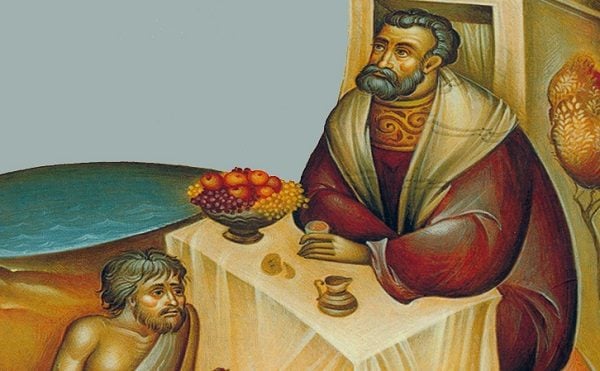Lazarus and the Rich Man

This Gospel has always been a cause of fear for me. “You received what was good
during your lifetime while Lazarus likewise received what was bad.” I have never wanted for a
meal, I have never wanted for shelter—indeed have cool in the summer and warm in winter. I
have had a top-notch education, I’ve had employment which I loved, namely teaching, I’ve had
all the medical care I need, I’ve never had to bear the burden of administration, I have a
supportive community, I live in a country which prizes free speech and is the envy of many
nations, and above all I have been granted the surpassing knowledge of Jesus Christ. I have
truly received what was good during my lifetime, blessings few in the world can claim.
And who is this Lazarus lying on the rich man’s doorstep who received only what is bad?
St Luke masterfully portrays the inequity in a couple of brush strokes: rich man dressed in
purple feasting sumptuously each day; poor man denied a scrap from the table, sores licked by
dogs. We know who this Lazarus is. Global communication has put him at our doorstep. He is
the child in Sudan or Gaza dying of famine, the homeless in our own city. And what have I done
for him? That’s why this Gospel so torments the conscience. I live in the richest country in the
world and the gap between rich and poor just gets wider.
The question is what have I done with my wealth? Have I even noticed the poor man on
my threshold? I praise and thank God that he gave me the vocation of offering truth and
meaning to those hungry for these in my life as a teacher. I thank him that he has drawn me into
his very prayer to the Father for the redemption of the world several times a day, thereby letting
me partake of the most powerful weapon against evil the world has known. Nothing in the world
is more powerful than the prayer of Christ offered to the Father by the Church.
The rich man’s problem was that he accepted abundant gifts from God and let them stop
with him. He is like the Dead Sea that receives lifegiving waters from the Jordan but doesn’t give
them away so that nothing can live in it. He’s exactly like the man whose debt was forgiven but
who refused to pass on that forgiveness to others who were indebted to him. I define faith as
acceptance of Christ’s gift of himself. If I truly receive him I receive his power to change my life,
to make me like him, to empower me to give to others the love I have received from him. If I let
that love stop with me, it is not even real faith but a caricature of faith and it does me no good.
You, my friends, have received the love of God in your hearts. You come here to the
Eucharist to receive it again ever more deeply, to ask for your personal transformation in Christ.
You are the Church. We have moved into the age where people no longer say, “the Church
says,” identifying the Church with the hierarchy. We have understood that the Church is the laity,
a royal priesthood who have the charge of living the love they have received and so
transforming the world.
When I spoke of myself earlier, I meant neither to demean myself nor to exalt myself. I
have been able to pass on some of the riches I have received only through the loving mercy of
God, and he knows that I have missed many opportunities of doing so. So I take comfort from
another saying of the Lord in the Gospel of Luke where he says, “When you have done all you
have been commanded, say, ‘We are useless servants—we have only done what we were
supposed to do,’” and I trust that there is a place for me in the lowest corner of his kingdom. So,
my brothers and sisters, continue to do what you are already doing: receive deeply the gift the
Lord gives you of himself and let it make you a living witness to his Gospel, one who satisfies
the hunger of the world in the limited area of life he has entrusted to you.
.png)